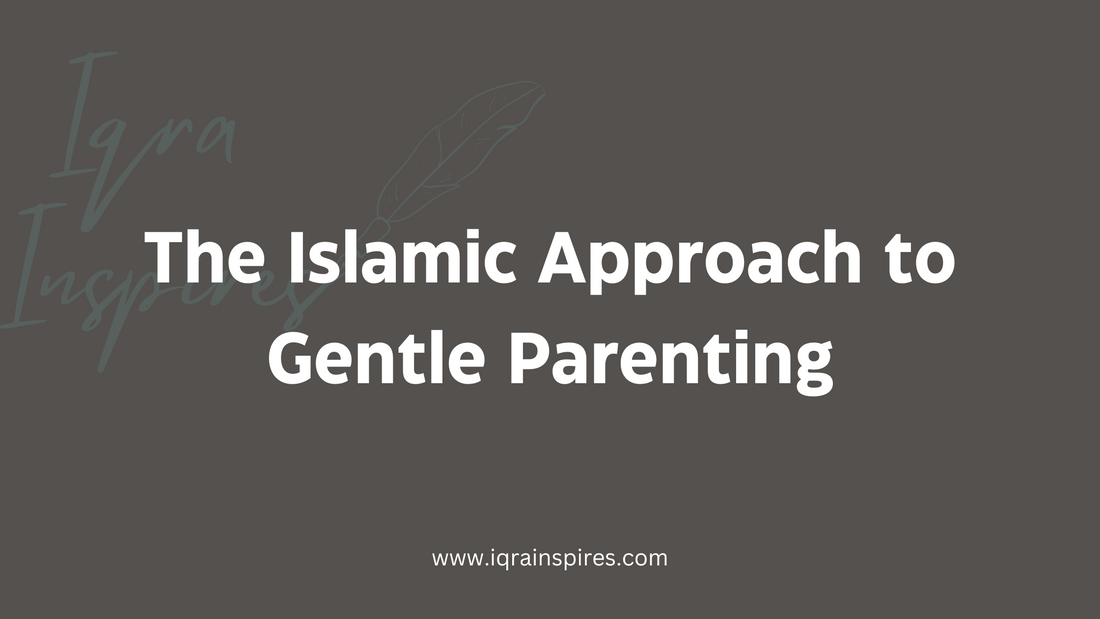
The Islamic Approach to Gentle Parenting
Share
Parenting is one of the greatest responsibilities given to us by Allah (SWT). As parents, we often wonder how best to nurture our children, balancing love, discipline, and faith. While modern parenting trends emphasize concepts like “gentle parenting,” the truth is, Islam has always advocated for raising children with rahma (mercy), patience, and wisdom.
Prophet Muhammad (PBUH) was the best example of a gentle parent, using kindness, respect, and emotional intelligence in his interactions with children.
So, What is Gentle Parenting?
Gentle parenting is an approach that prioritizes respect, empathy, and understanding over fear-based discipline. It does not mean permissiveness but rather focuses on teaching through connection rather than control. In Islam, this concept aligns with the tarbiyah (nurturing) approach emphasized by the Prophet (PBUH), who raised children with love and patience.
The Prophet Muhammad’s (PBUH) Parenting Style
The Prophet (PBUH) always prioritized love and emotional connection. He used to openly express his love. He would hug, kiss, and play with children.
Narrated by Abu Huraira (RA); Once, he kissed his grandson Hasan (RA) in front of a man who said, "I have ten children and I have never kissed any of them." The Prophet (PBUH) replied, "He who does not show mercy will not be shown mercy."
📖 Sahih al-Bukhari (No. 5997)
📖 Sahih Muslim (No. 2318)
Lesson: Never withhold affection. Physical and emotional closeness develops security and self-worth in children.
How to Apply Islamic Gentle Parenting in Daily Life
Build a Strong Relationship with Your Children
A strong bond between parents and children is essential for a child’s emotional, psychological, and spiritual growth. When children feel deeply connected to their parents, they develop a sense of security, confidence, and trust. This bond becomes their emotional foundation, shaping their behavior, self-worth, and even their relationship with Allah.
Children who have a close relationship with their parents are more likely to communicate openly, seek guidance in difficult times, and develop strong moral values. On the other hand, when this bond is weak, children may feel neglected, misunderstood, or disconnected, making them more vulnerable to external influences.
Key Action: Prioritize presence over presents. Your time and attention matters the most.
Discipline with Wisdom, Not Fear
Discipline in Islam is about teaching, not punishing. Shouting, harsh words, or physical punishment may create fear, but they do not instill self-discipline. Instead of focusing on immediate obedience through fear, wise discipline helps children develop a sense of responsibility and moral awareness.
The Prophet Muhammad (PBUH) never resorted to harshness when correcting mistakes. He guided with patience, gentle reminders, and logical explanations. When we explain consequences calmly and help children understand the impact of their actions, they learn to make better choices out of understanding rather than fear.
💡 Key Reminder: Be a role model for the behavior you wish to see in your child.
Encourage Independence & Responsibility
One of the greatest gifts parents can give their children is the ability to think and act independently with a sense of responsibility. Islam encourages self-sufficiency, accountability, and problem-solving from an early age. The Prophet Muhammad (PBUH) entrusted young companions with important tasks, showing that children are capable when given the right guidance and trust.
Rather than doing everything for them, involve your children in age-appropriate responsibilities. Allow them to make choices, solve problems, and experience natural consequences. This builds confidence, self-discipline, and a sense of achievement. Encouraging independence does not mean leaving children to fend for themselves, it means providing a supportive environment where they can grow into capable, responsible individuals.
Teach Emotional Regulation Through the Sunnah
Helping children manage their emotions is a crucial part of parenting, and Islam provides beautiful guidance on how to do so. Instead of dismissing or punishing a child’s feelings, teach them how to regulate their emotions.
When a child is upset, remind them to seek refuge in Allah by saying:
“A’udhu billahi min ash-shaytan ir-rajim”
(I seek refuge in Allah from the accursed Shaytan)
Encourage them to take deep breaths, make wudu (ablution), and sit or lie down if they are feeling angry, as the Prophet (PBUH) advised. Guide them to express their feelings through dua, such as saying, “Ya Allah, help me calm down.” Teaching these habits from a young age helps children develop patience, self-control, and reliance on Allah in times of distress.
💡 Key Action: Be a role model. Show patience in stressful situations so they learn by example.
Children’s Rights Over Their Parents in Islam
Islam emphasizes that children have rights that parents must fulfill. These rights are divine responsibilities.
1. The right to a good name
2. The right to love and kindness
3. The right to provision and protection
4. The right to education
5. The right to be raised in faith
6. The right to justice among siblings
7. The right to inheritance
8. The right to marriage support
Parenting as an Amanah (Trust from Allah)
Parenting is not just a responsibility, it is a sacred trust from Allah. Our children are not our possessions but souls entrusted to us, and we will be held accountable for how we raise them. No parent is perfect, but sincerity, effort, and dua can lead to success. If we raise our children with love, respect, and the principles of Islam, they will grow into strong, compassionate, and God-fearing individuals.
💡 Final Reminder: Raise your children as an act of worship, seeking Allah’s pleasure, and He will bless your efforts. May Allah grant us wisdom and ease in fulfilling this amanah. Ameen.



